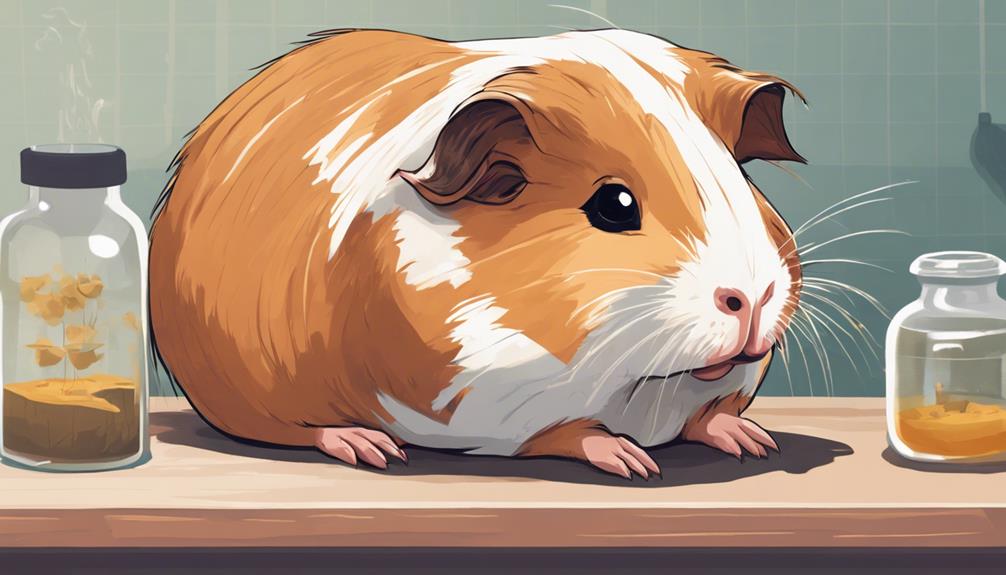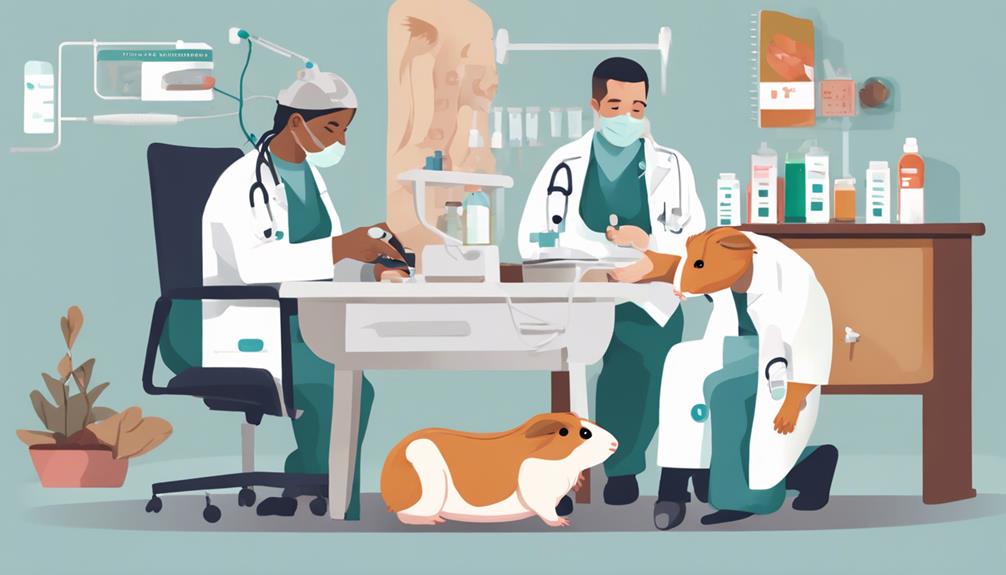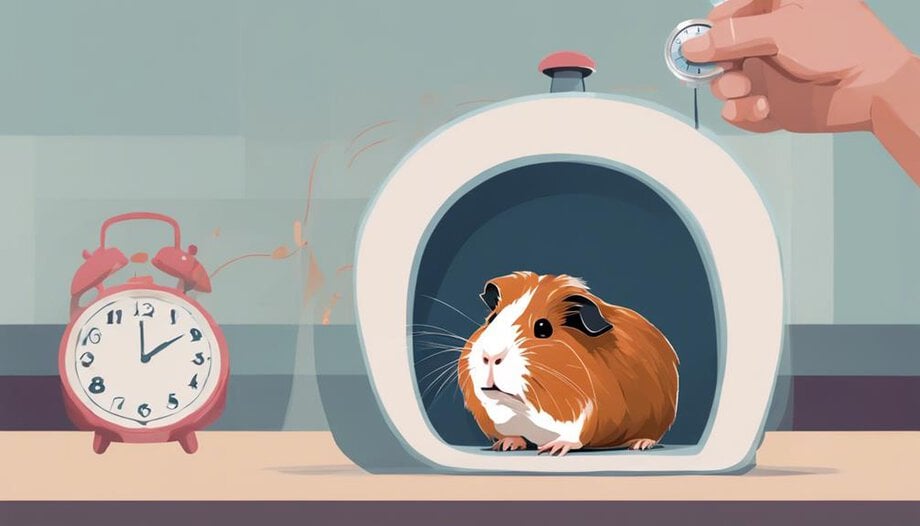What to Do About Guinea Pig Bloat and Digestive Distress

How to Help Guinea Pigs with Bloat and Digestive Distress:
Learn the signs, triggers, and relief options for your furry friends.
Key Takeaways
- Promptly contact a vet for swollen abdomen or decreased appetite.
- Provide a cozy environment and gentle belly massages for relief.
- Incorporate fiber-rich foods like hay and leafy greens for gut health.
- Utilize safe home remedies and preventive measures for digestive distress.
Signs of Guinea Pig Bloat
Guinea pigs experiencing bloat often exhibit symptoms such as a swollen abdomen, difficulty breathing, and decreased appetite. These warning signs indicate a potential issue with their digestive health that requires immediate attention.
To prevent bloat, make sure your guinea pig has a balanced diet rich in hay and fresh vegetables, along with access to clean water at all times. It's important to monitor their food intake and avoid sudden dietary changes.
In case your guinea pig displays signs of bloat, it's essential to act promptly. Contact a veterinarian experienced in guinea pig care for emergency care. Don't attempt to treat bloat at home without professional guidance, as it can worsen the situation. Your primary focus should be on seeking expert assistance to ensure the well-being of your beloved pet.
Common Causes of Digestive Distress
Digestive distress in guinea pigs can be caused by various factors, including dietary indiscretions and stress. Guinea pigs have sensitive digestive systems, and sudden changes in their diet or exposure to high-stress environments can lead to discomfort. To help prevent digestive distress, it's important to provide a consistent and balanced diet rich in fiber, such as fresh hay and vegetables. Additionally, ensuring that guinea pigs have access to clean water at all times is essential for their digestive health.
In some cases, guinea pigs may benefit from the supplementation of digestive enzymes or probiotic supplements. Digestive enzymes help break down food more effectively, aiding in the digestion process. Probiotic supplements can also be beneficial in maintaining a healthy gut flora balance, which is essential for proper digestion and overall well-being.
Immediate Actions to Take
When faced with a guinea pig experiencing bloat or digestive distress, immediate actions are essential to alleviate discomfort and prevent further complications. Here are some steps to take for emergency care and immediate relief:
| Action | Description | Importance |
|---|---|---|
| Contact a vet | Seek professional guidance promptly to assess the situation and determine the best course of action. | Crucial |
| Provide a cozy environment | Make sure your guinea pig is in a warm, quiet, and stress-free space to help ease their discomfort and aid relaxation. | Essential |
| Gently massage the belly | Lightly massage the guinea pig's belly in a clockwise motion to promote gas release and alleviate bloating. | Helpful in providing relief |
Dietary Adjustments for Prevention
Guinea pigs thrive on a diet that promotes gut health, including leafy greens and vegetables. Incorporating fiber-rich foods like hay and fresh grass can aid in digestion and prevent bloating.
Additionally, ensuring your furry friend has access to fresh water at all times is essential for maintaining proper hydration levels.
Food for Gut Health
To promote ideal gut health in guinea pigs, consider incorporating a variety of fibrous vegetables and hay into their daily diet. These fiber-rich foods aid in digestion, prevent bloat, and maintain the delicate balance of their gut flora.
Additionally, integrating foods rich in probiotic benefits can further support their gut health. Probiotics help in promoting the growth of good bacteria in the digestive tract, enhancing overall gut functionality and reducing the risk of digestive distress.
Including digestive enzymes through natural supplementation can assist in breaking down tough fibers and improving nutrient absorption. By offering a balanced diet that includes these essential components, you can help your guinea pig maintain excellent gut health and prevent digestive issues.
Fiber-Rich Options
Incorporate a variety of fiber-rich vegetables and hay into your guinea pig's daily diet to promote digestive health and prevent bloat. Fiber aids in digestion by keeping the gut moving and preventing blockages that can lead to bloat.
Vegetables like bell peppers, leafy greens, and carrots are excellent choices. Additionally, Timothy hay is a staple for guinea pigs, providing essential roughage for their digestive system.
To further support gut health, consider offering digestive supplements designed for guinea pigs, which can help maintain a healthy digestive tract. Including probiotic treats in their diet can also introduce beneficial bacteria that aid in digestion.
Hydration Importance
Prioritize maintaining proper hydration levels in your guinea pig's diet to prevent digestive distress and support overall well-being. Adequate water intake is essential for guinea pigs to maintain proper electrolyte balance and promote healthy digestion.
To make sure your furry friend stays hydrated, provide fresh, clean water daily in a sipper bottle to prevent contamination. Additionally, consider offering hydrating fruits and vegetables like cucumber and lettuce as treats to increase water consumption.
Monitoring your guinea pig's hydration levels is important, as dehydration can lead to serious health issues. By incorporating these hydration tips into your guinea pig's diet, you can help prevent digestive complications and contribute to their overall digestive health and well-being.
Safe and Effective Home Remedies
Consider incorporating gentle herbal teas or probiotic-rich foods to help alleviate guinea pig bloat and digestive distress at home. Herbal remedies such as chamomile or peppermint tea can aid in soothing their digestive system. Probiotics, found in foods like plain yogurt or certain vegetables, can help guarantee the balance of healthy bacteria in their gut. Additionally, digestive enzymes, which can be found in some fruits like papaya, may assist in breaking down food more easily.
A gentle massage on your guinea pig's tummy can also provide comfort and help stimulate digestion. Using circular motions with gentle pressure, massage their abdomen to help relieve gas and bloating. Make sure the environment is calm and quiet to help your furry friend relax during this process.
Veterinary Care and Treatments

When facing guinea pig bloat and digestive distress, seeking veterinary care is essential.
Treatment options are available to address these issues effectively.
Treatment Options Available
For guinea pigs experiencing bloat and digestive distress, timely veterinary care and treatments are essential for successful recovery and relief. When seeking treatment options for your furry friend, consider the following:
- Herbal Remedies and Probiotics: Herbal remedies can aid in soothing the digestive system, while probiotics help restore healthy gut bacteria.
- Digestive Enzymes and Holistic Approach: Digestive enzymes can assist in breaking down food for easier digestion, and a thorough approach addresses the underlying causes of digestive issues for thorough care.
- Professional Veterinary Consultation: Consult a veterinarian experienced in treating guinea pigs to receive tailored advice and medication for your pet's specific condition.
Importance of Vet Care
Timely veterinary care is essential in addressing guinea pig bloat and digestive distress, ensuring prompt relief and successful recovery for your beloved pet.
In emergency situations where your guinea pig is showing signs of bloat or digestive issues such as gas, bloating, or discomfort, seeking immediate veterinary attention is important. A knowledgeable veterinarian can conduct a thorough examination, provide appropriate treatments, and offer valuable guidance on preventive measures to safeguard your pet's digestive health.
Regular check-ups and consultations with a qualified exotic animal vet can also help in identifying early warning signs of potential digestive issues, allowing for timely intervention before they escalate. Remember, proactive veterinary care is key to maintaining your guinea pig's well-being and preventing serious complications.
Managing Digestive Distress
Wisely consider the veterinary care and treatments available for managing digestive distress in guinea pigs to guarantee the well-being of your pet. When addressing digestive distress in guinea pigs, it's important to focus on providing them with the necessary support and care. Here are three essential elements to think about:
- Digestive Supplements: Consult with a veterinarian to determine if your guinea pig would benefit from digestive supplements to aid in digestion and alleviate distress.
- Stress Management: Implement strategies to reduce stress levels in your guinea pig's environment, as stress can contribute to digestive issues. Make sure they have a quiet, safe space to relax.
- Regular Veterinary Check-ups: Schedule routine check-ups with a qualified veterinarian to monitor your guinea pig's digestive health and address any concerns promptly.
Monitoring Recovery Progress

To guarantee a successful recovery for your guinea pig, it's essential to closely monitor its progress following treatment for bloat and digestive distress. Keep a keen eye on recovery milestones and utilize effective monitoring techniques to guarantee your pet is on the right track. Establishing a recovery timeline will help you track progress and identify any setbacks promptly.
Observation tips play an important role in monitoring your guinea pig's recovery. Look out for signs of improvement such as increased activity levels, normal eating habits, and regular bowel movements. Conversely, be vigilant for any signs of lingering discomfort, bloating, or changes in behavior that may indicate a need for further veterinary attention.
Preventing Recurrence of Digestive Issues
To prevent a recurrence of digestive issues in your guinea pig, establishing a consistent dietary and exercise routine is crucial. Here are three key strategies to help you in preventing digestive problems in your beloved pet:
- Stress Management: Guinea pigs are sensitive animals that can easily get stressed, leading to digestive issues. Make sure their living environment is peaceful, with minimal noise and disturbances. Spend quality time bonding with your guinea pig to help reduce their stress levels.
- Balanced Diet: Provide your guinea pig with a well-balanced diet rich in hay, fresh vegetables, and limited fruits. Avoid sudden changes in their diet and make sure they've access to fresh water at all times.
- Exercise Routine: Encourage physical activity by providing ample space for your guinea pig to move around. Create a safe play area with tunnels, toys, and obstacles to keep them active and engaged.
Frequently Asked Questions
Can Guinea Pigs With Bloat or Digestive Distress Still Eat Their Normal Diet?
In times of bloat or digestive distress, guinea pigs may need dietary modifications. They should refrain from their normal diet until recovery. Supplement recommendations can aid in treatment, ensuring a smoother recovery timeline.
Is There a Specific Age Group of Guinea Pigs That Is More Prone to Digestive Issues?
Age factors can influence guinea pigs' digestive health, with young and older ones being more prone to issues. To prevent problems, consider dietary adjustments tailored to their age and provide proper care to support their digestive system.
Are There Any Long-Term Consequences for Guinea Pigs Who Have Experienced Bloat or Digestive Distress?
Long-term consequences for guinea pigs who have experienced bloat or digestive distress can include ongoing gastrointestinal issues, reduced quality of life, and potential organ damage. Monitoring signs, preventative measures, and timely treatment are essential for their well-being.
Can Stress or Changes in Environment Trigger Digestive Issues in Guinea Pigs?
Stress management and dietary adjustments are essential for maintaining guinea pigs' digestive health. Environmental factors, such as sudden changes, can trigger digestive issues. Ensuring a calm environment and a balanced diet can help prevent such complications.
How Often Should a Guinea Pig's Diet Be Adjusted to Prevent Digestive Issues in the Future?
Like a skilled gardener tending to delicate blooms, adjusting the frequency of a guinea pig's diet is key to preventing digestive issues. Regular checks and gradual tweaks can help maintain their well-being and digestive health.











